Ukraine's city of refuge works to build new future with housing — and arms
- Oops!Something went wrong.Please try again later.
LVIV, Ukraine — As the war enters its third month, for many displaced Ukrainians this city has transformed from a temporary sanctuary to a permanent home.
Even as more people flee the country’s south and east, where Russian forces continue to pummel cities and towns, Lviv is now working to contend with its own future. It will now seek to maintain some semblance of order, all while grappling with a country mangled by war and the pressure of accommodating hundreds of thousands of Ukrainians who have fled their homes.
Dressed in a military-green hoodie, Mayor Andriy Sadovyi acknowledged his city was struggling to accommodate an estimated 200,000 new residents.
Traffic in Lviv has ground to a standstill — especially around the train station — with cars flooding the city from Ukraine’s east and testing the bandwidth of its infrastructure. Affordable housing is increasingly difficult to find. Still, the mayor said he considered this moment as an opportunity for Lviv’s economy and Ukraine’s defense.
“We are working to wrap our heads around the future in general because we basically need to reform our economy,” Sadovyi said, his hands clasped as he sat at a small table in his office in Lviv’s opulent Viennese town hall, which dates to the 14th century. “We need to place emphasis on the military industrial complex because we need to have our own weapons and armaments, and we had a deep tradition of that in the past.”
Housing and jobs in wartime
The mayor predicts 50,000 displaced Ukrainians will remain in the city permanently, increasing the population by 7 percent — though it’s currently swelled by almost a third. The immediate goal is to provide the new residents with housing and jobs, while also making the city a new production base with a potential emphasis on arms manufacturing to aid the country’s war effort.
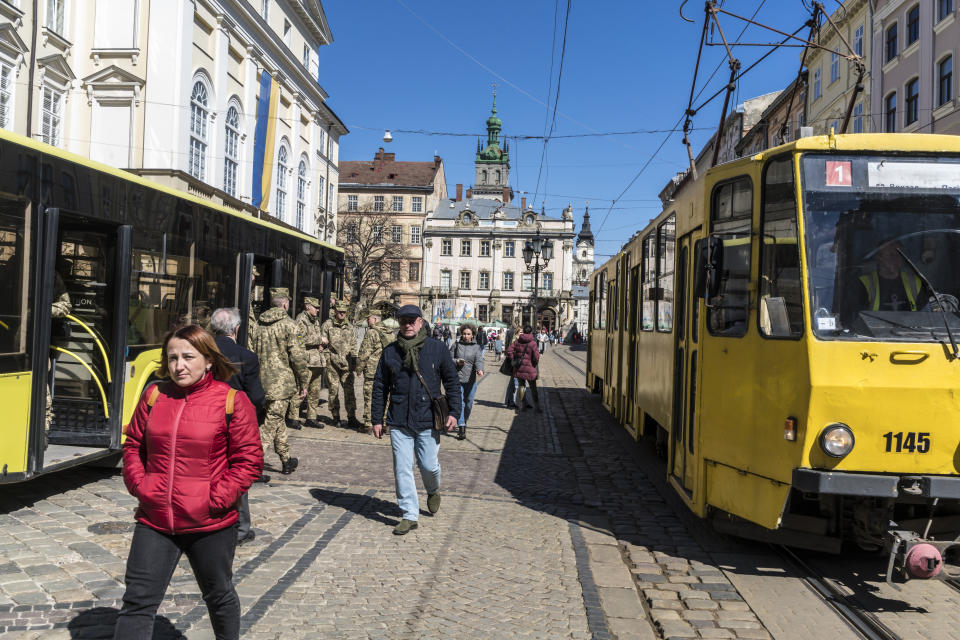
Money, resources and construction materials are tight, however. Sodvyi predicts Lviv will need nearly 11 million square feet of additional housing, at a cost of around $785 million. Some production facilities, whether they be for arms or Sodvyi’s hope to build electric cars, would also need to be constructed from scratch. Housing pressure is the biggest challenge and rent prices are rising. The Bureau for Economic Security of Ukraine, a state agency, reported that many of the complaints it has received since the start of the war are about the sudden increase in housing costs.
Sodvyi rejected the characterization that his city was experiencing ever-inflating rental prices and emphasized that Lviv had tamped down on landlords jacking up costs. He said anyone raising housing prices should be reported as “a looter” to the city government.
Still, Lviv’s housing availability has its limits.
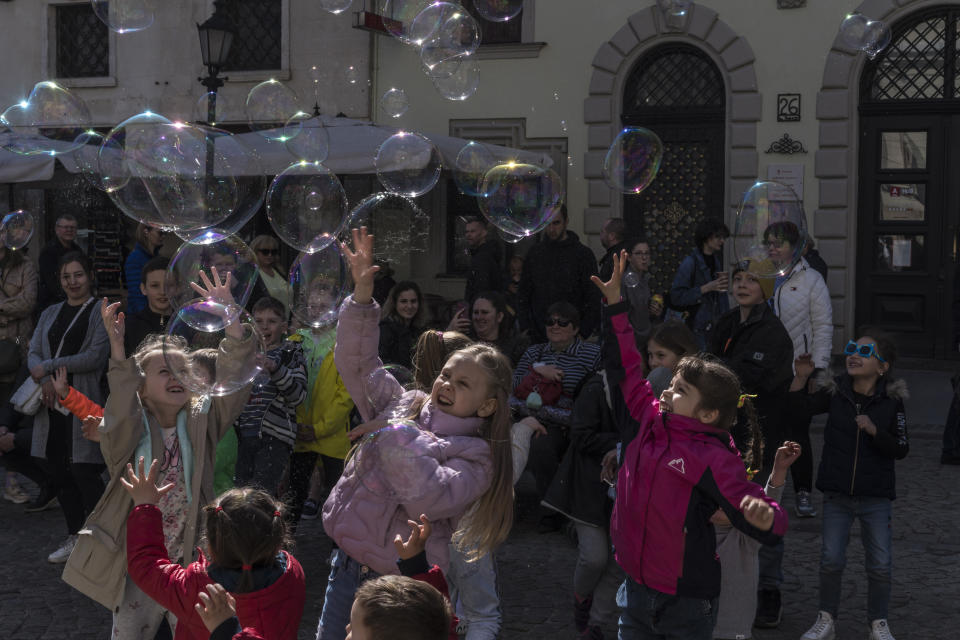
As a temporary fix, the city and the Ukrainian Red Cross agreed on Sunday to start building homes for pregnant women displaced by the war in its latest housing expansion.
A few weeks ago, the Polish government began helping the city build temporary housing in parks and other locations around Lviv. A collection of basketball courts in Stryiskyi Park has become the concrete foundation for small rectangular homes that hundreds of displaced college students from across Ukraine will occupy. Four small bunks, a single window, a small table and some closet space make for tight accommodations.
A central hall was built to create a cafeteria, and there are bathrooms with shower stalls. While the tight quarters may not be ideal for students attending classes online, it does help lessen the housing pressure. Water mains and electricity are still being hooked up, and it should be finished in the coming days.
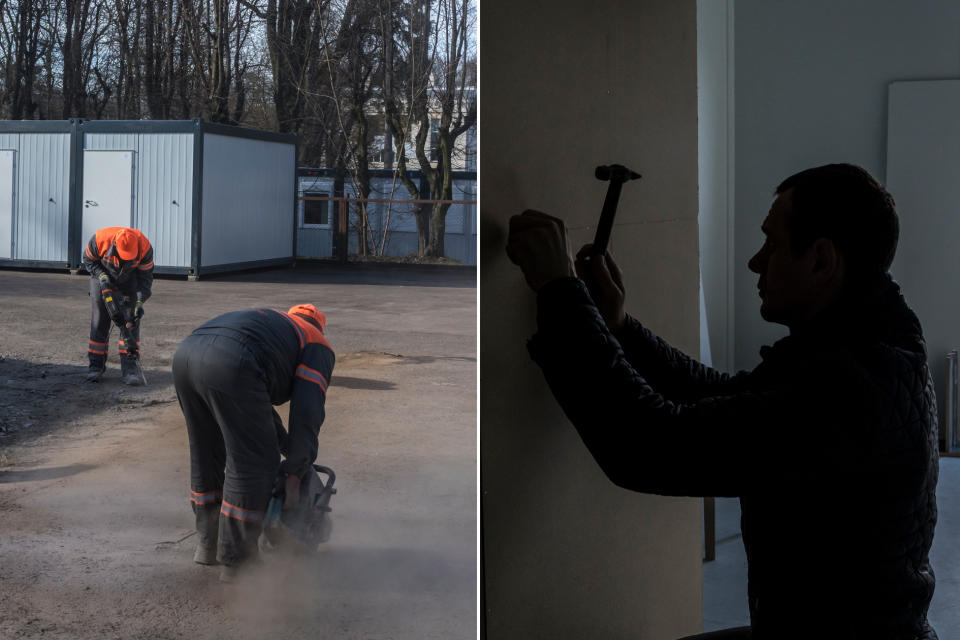
“There are jobs being created, and the students will have comfortable lives and good employment opportunities here in Lviv,” said Myzow Lesyuk, 53, a construction worker who had volunteered to help build the homes. “So it makes little sense for them to go and live in the rubble.”
Meanwhile, to build the manufacturing arm and protect Lviv from becoming a target, Sadovyi emphasized the need for the city to have a strong missile and air defense system to protect it. Otherwise, it could be vulnerable to attack before it can muster an ability to further support the Ukrainian military.
That feeling of vulnerability has only grown stronger recently: Lviv saw its first deaths from a missile attack on Easter Monday. Five missiles struck close to the train station, a key transportation center for the entire country now, killing at least seven people and injuring a handful more.
“There is no safe or unsafe location in Ukraine now,” Sadovyi said after the strike.
A gateway and a refuge
Still, the city remains an essential hub for the flow of displaced people. Authorities reported Wednesday that 1.8 million people had crossed the border leaving Ukraine through the Lviv region since the war started Feb. 24. Around 650,000 have since returned through the area and about 135,000 tons of humanitarian aid had crossed the border into Lviv, as well.
While the trains are considered a key artery for people and humanitarian supplies, they are also viewed as a military target. Even with the ongoing threat of missiles, however, Lviv’s train station remains busy as each day brings more Ukrainians fleeing the Kremlin’s forces.
Lena Timasheva, 38, and Alla Bobro, 43, spent six weeks in a basement hiding from Russia’s bombardment of Kharkiv, a city in the country’s east, before they were finally able to escape.
In a corner of the Lviv train station surrounded by hundreds of other displaced Ukrainians holding bags filled with all their remaining possessions, the two recalled the weeks that had passed with minimal daylight, dwindling food, little clean water and no clear prospect for escape as they huddled together.
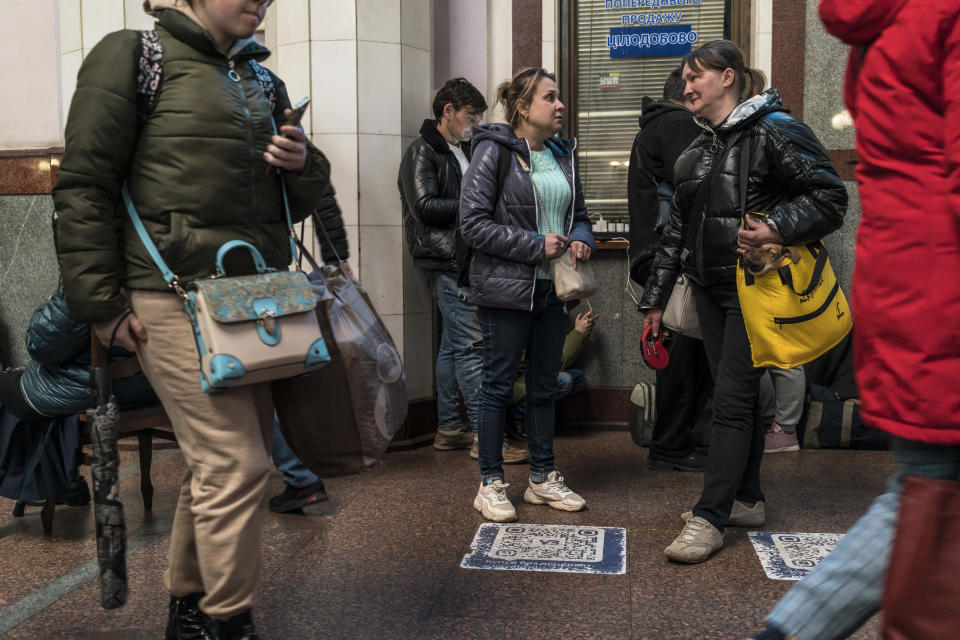
Bobro’s dog, whom she named War and rescued from the streets between Russian bombings, whined softly as they remarked on the perceived safety of Lviv.
“There was no way to get out of Kharkiv before now. There are dead bodies everywhere and everything is destroyed, even the schools,” Timasheva said. “This is so different.”
Different is not always comforting, however.
About a hundred yards from the train station, volunteers have made a space they hope will provide some solace to mothers and small children after a long and perilous journey. Working in a once-unfinished room in a new building, they’ve put mats down on the floors, cribs in the corners and covered the walls in children’s art.
Viktoria Pazyayeva, 21, held her 3-month-old son in a corner of the room. She and her two children had escaped a village near Kherson, in the country’s south, where Russian troops had begun to flatten homes and buildings. After Russians searched and looted her home, she said she’d had enough. The family took a harrowing drive through Russian checkpoints where soldiers made everyone strip so they could search for Ukrainian tattoos. The men were interrogated about whether they would join the Ukrainian military.
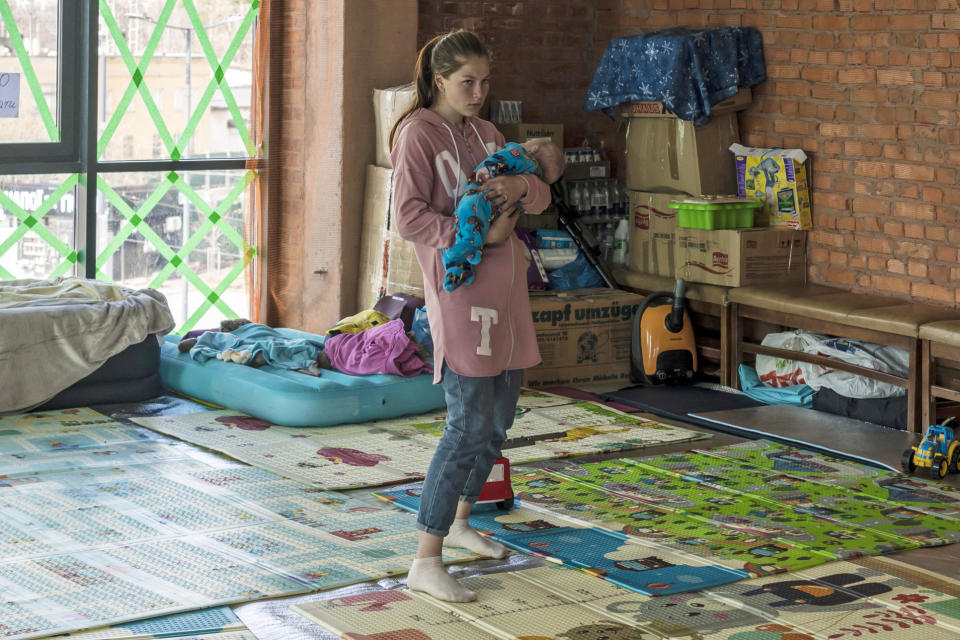
“My daughter couldn’t understand what was going on,” she said, pointing at her 3-year-old. “She was crying and begging to go home, but I was so happy to finally see Ukrainian troops. Now I will meet my husband, and I hope we can find work here and a place to live.”
But not all intended to stay in Lviv.
Samyska Halyna, 80, waited at the train station on a hard wooden chair a volunteer had found for her. The Ukrainian babushka waited for a departing train headed east.
She said she was ready to go home to Zaporizhzhya, which is only miles from the Ukrainian front. There she would live her remaining days, Halyna said, and fight for her country’s freedom, just like her father did in World War II.
“My father died fighting for this country, and I will do the same,” she said, as she waved her cane. “I’ll beat the Russians with my stick if I have to.”

